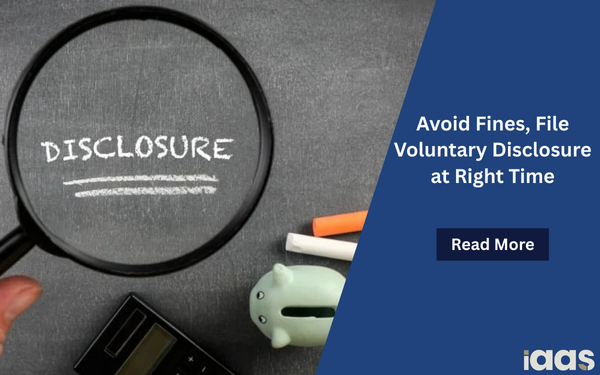
Avoid Fines, File Voluntary Disclosure at Right Time
September 13, 2025

Avoid Fines, File Voluntary Disclosure at Right Time
Voluntary disclosure: what is it?
Voluntary Disclosure is defined as “a form prepared by the Authority pursuant to which the Taxpayer notifies the Authority of any error or omission in the Tax Return, Tax Assessment, or Tax Refund application in accordance with the provisions of the Tax Procedures Law” in Article 1 of the UAE VAT Federal Decree Law.
Depending on the error or omission pertaining to a certain taxable period, the registered individual must submit this form separately using their own EmaraTax site. Like previous applications, it will need to be reviewed and approved by the FTA. The turnaround time is normally 20 business days, although it could take longer if the repair is complicated.
When Should a Voluntary Disclosure Be Filed?
A Tax Procedural Guide on when to file a Voluntary Disclosure was first published by the FTA. According to Article 10 of Cabinet Decision No.74 of 2023 (Executive Regulation of Federal Decree Law of No.28 of 2022 on Tax Procedures) and Article 10 of Federal Decree-Law No. 28 of 2022 (Tax Procedures Law),
Regarding Underpaid Tax:
Within 20 working days, the Taxable Person must submit a Voluntary Disclosure if the error causes underpaid tax over AED 10,000.
The Taxable Person shall remedy the error in the next due tax return (or the return of the period when the error is found) if the error is AED 10,000 or less. Within 20 business days, a voluntary disclosure must be made if there isn’t a return of that kind available.
Regarding Exaggerated Refunds:
A Voluntary Disclosure must be filed within 20 business days if a refund application error results in a claim that exceeds one’s entitlement, unless the error is related to a return or assessment (in which case the preceding underpaid tax regulations apply).
Mistakes Without a Tax Difference:
The Taxpayer must nonetheless make the correction or provide a Voluntary Disclosure as instructed by the Authority even if the error or omission has no effect on the amount of tax due.
The Authority has published FTA Decision No. 8 of 2024, dated 1 November 2024, with effect from 1 January 2025, in response to the fact that many registrants are unsure if a Voluntary Disclosure is necessary where an inaccuracy has no direct influence on the overall amount of tax payable or refundable for a certain period.
This ruling outlines the circumstances in which a voluntary disclosure must be made even if the overall amount of taxes owed is unaffected:
1. Inaccurate Standard-Rated Supply Emirate Reporting:
For instance, rather of using Box 1b (Dubai), a registrant reports standard-rated supply in Box 1a (Abu Dhabi). The reporting according to Emirate is inaccurate, even though the total amount of tax owed remains unchanged.
- Inaccurate Zero-Rated Supply Reporting:
For instance, a registrant decided that supplies should be zero-rated after first treating them as out of scope. This has an impact on the accuracy of the total taxable supplies recorded, but it has no effect on the total amount of VAT due.
3. Inaccurate Exempt Supply Reporting:
Example: The value of exempt supplies is misrepresented by a registrant. Like zero-rated supplies, this leads to inaccurate reporting of total supplies but has no effect on the tax due.
Does voluntary disclosure carry any penalties?
Under UAE VAT law, the taxpayer may be subject to ordinary administrative penalties if a Voluntary Disclosure is made after the FTA has already found the error or if the Voluntary Disclosure does not completely fix the identified error. The type and seriousness of the non-compliance determine which sanctions apply.
For example, penalties for underreporting taxes can vary from 5% to 50% of the underreported tax, depending on the extent of the error, whether similar mistakes have been made before, and whether the FTA views the behavior as deliberate, careless, or the result of repeated non-compliance.
The type of fault (e.g., understated tax versus misreported supply), the frequency of the error, and the FTA’s evaluation of the taxpayer’s purpose or negligence all influence the precise penalty in each case. These penalties are typically lessened by timely and accurate Voluntary Disclosure submission, emphasizing the significance of responding openly and quickly when mistakes are found.
In conclusion, the Voluntary Disclosure process was put in place to enable individuals who are enrolled to rectify mistakes on their tax returns. Its existence does not, however, absolve the registrant of the obligation to file accurate returns and use the appropriate tax treatment. The FTA highlights that as a sign of good faith and legal conformity, the registrant bears the obligation to swiftly rectify such inaccuracies upon discovery. Voluntary Disclosure should be utilized as a tool to address real problems rather than as an excuse for improper filing.
Latest Post



Support

Financial Success Made Simple
- +971 54 477 0487
- info@iaasconsultancy.com
Let's start building your financial future!
Designed by BlackHole Art Studios
Copyright © 2024. All rights reserved.

